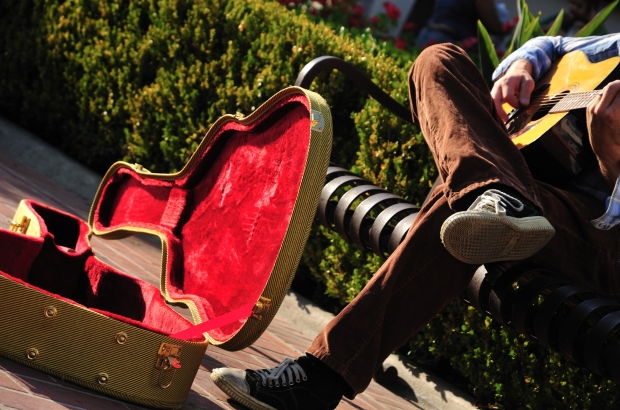- Daily & Weekly newsletters
- Buy & download The Bulletin
- Comment on our articles
Brussels sees sharp decline in number of buskers
The number of licences for buskers in Brussels has halved in recent years, although the city council and performers are at odds over whether this is a positive development or a negative one.
The City of Brussels wants to revise the application process to attract more talented buskers, Bruzz reports. But some artists see an advantage to the reduced competition that the lower number of total buskers brings.
Currently to get a permit to busk in the centre of Brussels, a musician must apply to the city and audition in front of a jury. If the jury gives a positive opinion, the musician is granted a licence. Artists who can present an artistic diploma are exempted.
Belgian-British busker Will told Bruzz that he had seen “quite a difference from 10, 15 years ago” when it comes to the number of buskers in the capital.
But Will is not among those celebrating less competition. “I think it’s very unfortunate that there are fewer buskers,” he said. “It detracts from the city – music offers the city a better reputation.”
According to the City of Brussels, the number of licences granted has plummeted in recent years, from 400 in 2018 to 191 in 2022 – a decrease of more than half.
Transport company Stib also hands out permits to perform in metro stations and confirmed the same downward trend: before the pandemic, it gave out about 160 permits a year, now only about 40.
Will attributes the decline to the pandemic: “Street musicians are usually not entitled to unemployment benefits and can’t fall back on a social safety net.
"Many quit during the pandemic and looked for a job that offered more social protection. I heard about the same problems in Ireland, which is now considering paying street musicians some kind of fixed wage."
Joni Sheila, who busked in Brussels for many years, confirmed: “During the pandemic, playing in the streets was almost impossible. Either the police intervened very quickly or there were no people walking the streets. Some lapsed into depression as a result.”
Will noted a positive consequence to having fewer musicians on the streets, albeit unintentionally: “I think that's why the police are so lax towards me today, because there are hardly any musicians left. If cops intervene now, you must be really bad.”
Jon, a French busker from Bordeaux, noted that busking has become somewhat less lucrative now that fewer people carry cash.
“Since about two years we have been getting less cash,” he told Bruzz. “We could create a QR code for people to scan, or buy a device to pay with a card, but I have no idea how all that works. If they don't have money with them, many do offer drinks.”
Another busker, Juliette, noted another negative effect of the move to a cashless society: “Restaurants and shops used to like to see us coming: we could change our coins for banknotes and they had change for their till that way. With the trend of cashless payments, that too is becoming increasingly difficult.”
Buskers are quick to point out that the application process is onerous and auditions are only held a few times a year and during working hours. Performances are only allowed on alternate hours in the day - for example, it is banned between 11.00 and 12.00 and between 13.00 and 14.00. The use of an amplifier is also not allowed unless the mayor or his deputy explicitly gives permission.
As a result of the tedious process, many who busk in Brussels do so without a permit.
“The rules to be allowed to play in Brussels-City are too strict, and that has a discouraging effect,” one such busker explained.
“It's better to let people play freely at set times and places, or work with experimentation zones, which is much more accessible. Banning an amplifier immediately excludes some genres like hip-hop.”
Delphine Houba (PS), alderwoman for culture in Brussels-City, lamented the disappearance of street performers.
“They give Brussels a touch of magic,” Houba said. “At the same time, we have to think about the wellbeing of citizens and local residents. That is why it is important to regulate the practice of street performers as much as possible, so that all parties feel heard and valued.”



















